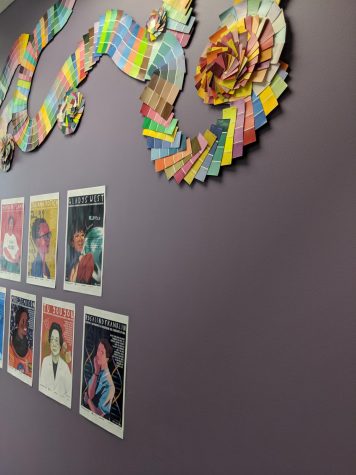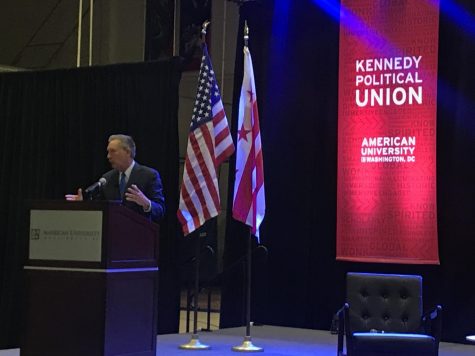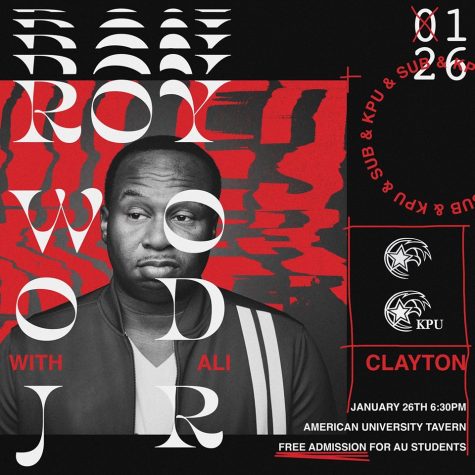Professor Profile: Chris Palmer
Chris Palmer teaches Environmental Filmmaking at American University. Born in Hong Kong and raised in London, Palmer came to the United States and joined American’s University’s staff in 2004. In addition to being a full-time professor, Palmer is an author, speaker, and comedian and has produced over 50 wildlife films. He is also the President of One World One Ocean, an educational campaign dedicated to restoring and protecting the world’s oceans. He explains the necessity of diligence and having a steady moral compass as not only the key to a successful life, but also to keeping the world habitable for future generations.
You’ve lived in Hong Kong, London and the US. What place do you consider “home”?
“Now, I consider my home to be Bethesda, Maryland where my family and I have lived for about 40 years but I still consider my original home to be Bath, England.”
Where was your favorite place that you’ve traveled? Where was the most dangerous place you’ve filmed?
“One of my favorite places I’ve been is Kodiak Island in Alaska. It’s so gloriously pristine and so much of it is untouched by human footprint. This island also has some of the largest brown bears in the world; some of them reach up to 1,500 pounds. As for danger, the most dangerous thing I’ve ever done is drive from my home to the airport. Flying in a small one-seated plane and filming bears in Alaska is far safer than a car ride anytime.”
Growing up, what were some of your inspirations?
“I really did not have much happen to me as a young person that inspired me to become interested in wildlife. Some people love it because maybe their dads took them out to Yellowstone or hunting. My parents had no interest in wildlife. I found myself drawn to Environmental when I realized that I could create a life for myself that was meaningful and I realized that protecting wildlife for future generations was something I could throw my life into.”
Your film Shooting in the Wild is about the dark side of wildlife filming which includes using captive animals or intentionally causing stressful situations. Do you feel that exploiting animals in film is getting worse or better?
“I think things are getting better because standards are improving. I think [what] people are realizing more and more are that animals are sentient and deserve more understanding and sympathy than they use to get. The bad news is that networks are desperate for ratings and that competition is getting more intense. How do they grab attention? High adrenaline, violence, dramatic shows, which, when you make these shows on a limited time schedule and budget, you are forced to be unethical. I worry that we’re improving, but not enough.”
Why did you make Shooting in the Wild?
“After working for over 30 years in wildlife film, I had become haunted by what I had seen. I was appalled by the lack of conservation, the deception and by the amount of animal harassment. People have no knowledge of these things and I wanted to put pressure on broadcasters and wildlife filmmakers to do a better job.”
So, what, in your opinion, would be the perfect wildlife show?
“The perfect wildlife show would have some kind of environmental message, not involve any sort of animal disturbance or harassment and not have fabrication. And it would have to be interesting!
“Low-wage workers propel large corporations to sky-high profits while earning barely enough to survive.”
So when you see it you want to talk about it, take action, or even write a contribution to Greenpeace. It would be a well-told story with characters and people would be inspired. I would say Blackfish got close to that.”
You’ve done so much; you’re an author, a filmmaker and producer and world traveler and then you became a professor in 2004. What inspired you to become a professor?
“I lost a job! I applied for a very high level job but I didn’t get it. At the time I was 56, and was wondering what I would do for the rest of my life. I just happened to run into a Professor Aufderheide who introduced me to the Dean. And from there I got the job and fell in love with teaching. I loved being a Dad to my three wonderful daughters and as I learned to be good dad, I used some of the skills I that I learned to be a better professor.”
You teach Environmental Film Making at AU. Some professors have the phrase “if there’s one thing I’d like you to get out of this class its….” Do you have that one specific thing?
“I have students of every major take this class, not Film and Media majors. Regardless of what they are studying, I want my students to have a transformative experience. I want them to come my class and for the three and a half months that they’re here with me, I want them to radically rethink what their lives are about and come out with renewed clarity of where they’re going. I want their professional lives to be significantly enhanced and improved.”
You are currently the President of the One World One Ocean Foundation, you’ve written your own book and you’re work has received so many awards. What is the key to staying humble?
“I always remind myself how indebted I am to everyone else. It makes me instinctively modest when I realize how dependent I am on my support system. And I can learn from everyone, they have had experiences that I’ve never had and it’s also the realization that I am just one small piece of a society that has to take on the huge problems of the world like climate change.”
What is your advice to the many film, journalism and other communication majors here at AU?
“Regardless of what career path you choose, have diligence. I encourage people to not waste time and also think about the values they live their lives by. The metaphor I like to use is that life is like a plane. Planes go off course all the time, like we make mistakes all of the time. But just as planes always go back to the flight plan, you have your values as a guidepost. Also, find mentors! I don’t send out a memo without my wife Gail reviewing it first.”






